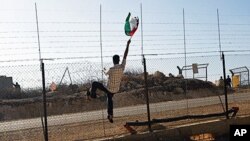As U.S. mediators work to restart Mideast peace negotiations, Israel is continuing work on a security barrier that has been under construction for years. Israel's aim is to save Israeli lives by keeping out Palestinian bombers.
The result has been a sharp reduction in the number of terrorist attacks in recent years. At the same time, Palestinians complain the barrier - consisting of both chain link fences and concrete walls - has created hardship by restricting their movement. Some, however, have benefited from it.
Israel's securitybarrier separating Israelis from Palestinians is, in some places, a concrete wall several meters high, and in others a chain-link fence. With its barbed wire, electronic surveillance devices and its watchtowers, it is an ugly reminder of the conflict.
To Palestinians, it is a symbol of Israeli oppression. And, it is being built with Palestinian hands.
Maher Abu Sharkh, a Palestinian construction contractor in the West Bank town, Ramallah, is among those who have helped build it.
He says there is no work inside the West Bank towns. He says life is difficult, so people prefer to go find work on Israeli projects, where they earn high salaries.
Every morning, scores of Palestinians line up at a checkpoint in the northern West Bank. They present papers to Israeli soldiers and board Israeli vehicles to sites where the wall is going up, escorted by armed guards.
For Israel, the barrier has meant better security for its citizens.
Israel's government says the barrier - combined with stepped-up intelligence efforts and cooperation by Palestinian security forces - has brought down the number of suicide bombings that were common in Israel until recently.
The barrier, however, has brought misery to average Palestinians - including Abu Sharkh's own family. Najat Abu Sharkh, his wife, says she is not able to visit relatives in other parts of the West Bank because she does not have the proper documents to get past the barrier and checkpoints her husband helped build.
She says she was not happy that her husband was working on the wall because, by doing so, she believes he was limiting the freedom of Palestinians including herself. She says the wall is a prison for everybody.
Many Palestinian laborers refuse to discuss their work on the barrier. Armed Israeli security agents prevent reporters from approaching the workers at the sites.
Many Palestinian laborers are fearful because they are often perceived by their own people as collaborators.
Maher Abu Sharkh made good money on his contracts building the wall, but he now sees that work as a source of shame.
He says he felt he was building a prison for his brothers, for his people. He says he could not stand it and thought to himself, "Am I crazy? Am I drunk?" He took his bulldozers and equipment and came to Ramallah, in the West Bank, and found other work. He is relieved to be working and he is happy.
With the West Bank's unemployment rate at nearly 20 percent, it is not easy for most Palestinians to find work elsewhere.
Until more jobs are created in the West Bank, many will have to make a difficult compromise at Israeli checkpoints each morning.

